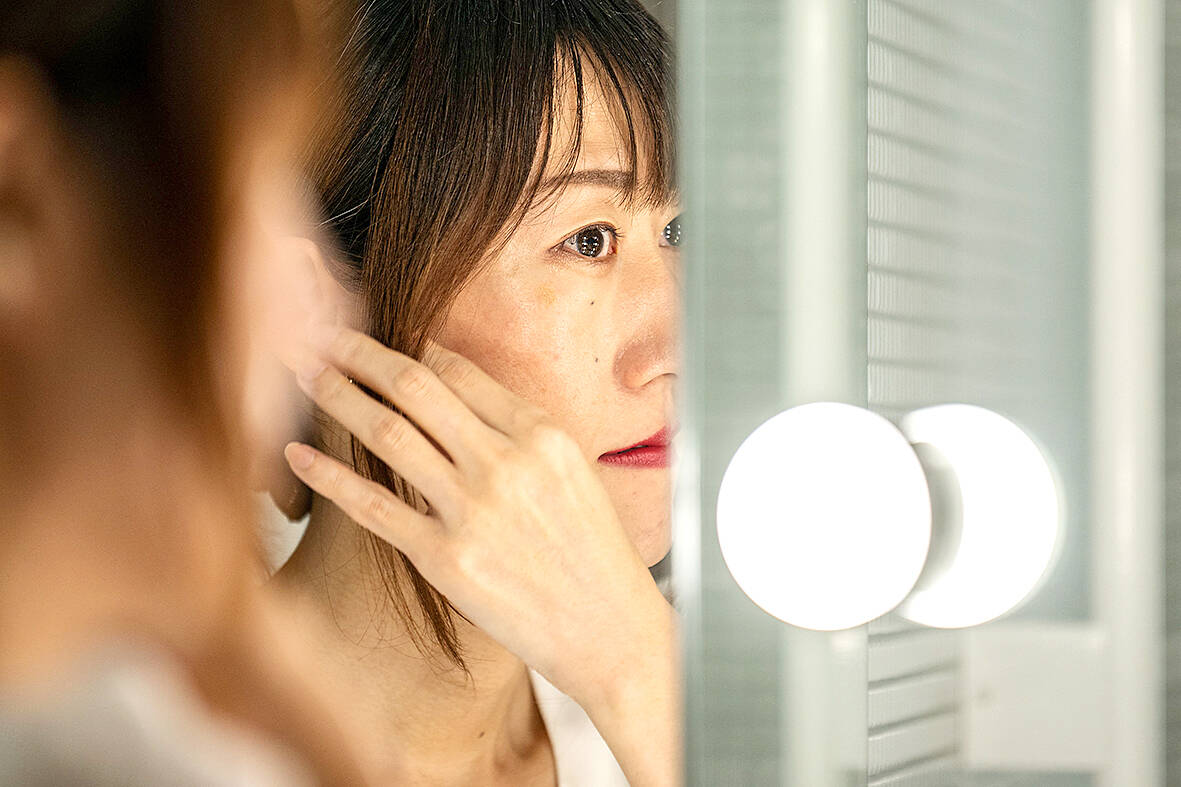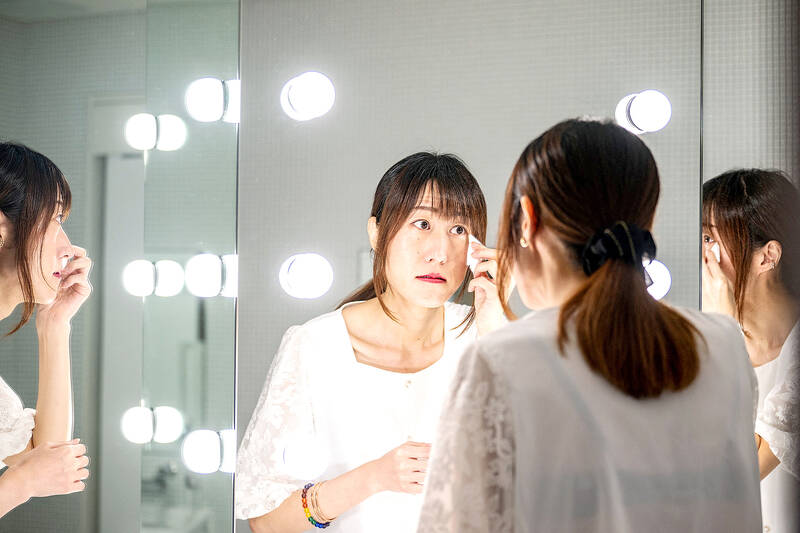A courtroom win and new anti-discrimination law could be seen as signs Japan is warming to the protection of LGBTQ rights. But activists warn of a dark side.
They say recent months have seen a rising tide of hateful online rhetoric, particularly targeting transgender women.
Disinformation “linking transgender women to sexual violence in public spaces” is being “disseminated extremely widely,” the Japan Alliance for LGBT Legislation said earlier this year.

Photo: AFP
The experience has been painful and even frightening for transgender women such as Minori Tokieda.
“We are portrayed as some kind of sex offenders — physically male people who would invade women’s spaces by claiming they’re female,” the activist said.
Many in her community are “deeply hurt” and “feeling in denial of our own existence — it’s a serious situation,” she added.

Photo: AFP
The thorny question of how to balance transgender rights with the protection of female spaces has already divided opinion in countries including Britain and the US.
It has arrived only more recently in Japan, fueled in part by contentious debate around anti-discrimination legislation that passed this year.
The law proposed to enshrine the concept of self-identified gender and “promote understanding” toward sexual minorities. But opponents denounced it as an open invitation for men masquerading as women to infiltrate spaces such as women’s toilets.
And in a nation famed for its public bathing culture, rumors swirled that it might allow men to soak naked with women by simply declaring themselves female.
‘WANNABE WOMAN’
“If I were a pervert, I would roam around (in a locker room) exposing my penis — I’d be forgiven because I’m a ‘woman at heart,’ right?” read one representative post on Twitter.
The controversy was only heightened by a Supreme Court ruling last week in favor of a transgender bureaucrat whose access to female toilets at work was restricted.
The online backlash was swift, with opponents using terms like jisho josei (wannabe women).
Japan has a mixed record on the rights of sexual minorities.
While outright violence is unusual and no law bars same-sex relationships, it is the only G7 country that does not recognize same-sex marriage or civil unions at a national level.
Transgender people can only change their gender on legal documents if they appeal to a family court and meet criteria including gender confirmation surgery and having no reproductive capacity — generally requiring sterilization.
The recent wave of anti-transgender rhetoric is essentially a spillover from similar movements overseas, experts say.
Images depicting transgender women as overly “masculine” — with sturdy physiques and muscles — are widely distributed to cement the view they look “indistinguishable” from men, said Aki Nomiya, a gender studies scholar at Kanagawa University.
“This way, campaigners can argue that allowing transgender women (into women’s spaces) will make it easier for men to blend in, including those with criminal proclivities,” said Nomiya, who herself is transgender. The backlash is not simply rhetorical: it was a factor in the eventual watering down of the anti-discrimination legislation, which now says the law is contingent on “the safety of all citizens being ensured.”
Authorities have also insisted access to public bathhouses will remain dictated by “physical characteristics.”
‘LACK OF UNDERSTANDING’
Still, controversy has continued to swell over everything from “genderless toilets” in Tokyo and a women’s university deciding to admit transgender students.
Among the loudest voices pushing back against transgender women’s access to female spaces is the group “Save Women’s Space.”
Co-head Minori Moriya insists her group is not targeting transgender women, but argues giving them access to female spaces will “open the floodgates” to male sexual offenders.
“Women have no way of telling who among those allowed inside have criminal intentions,” the retiree said.
She fears the Supreme Court could soon overturn requirements that transgender people undergo surgery before changing their gender on official documents.
“Those who retain male genitalia” should not be allowed in women’s restrooms, she said, “to protect women. That’s the line we cannot compromise over.”
Transgender people in Japan point out they have long discreetly used restrooms matching their gender identity, without incident.
Online depictions of transgender women aggressively demanding access to women’s spaces is divorced from reality, they add. Tokieda argues transgender women are being scapegoated for crimes committed by men.
“Sexual violence and camera voyeurism... should be penalized and cracked down on, but somehow transgender people are getting the blame,” she said.
The “vitriol and hate speech on social media are coming from an overwhelming lack of understanding towards transgender people.”

Following the shock complete failure of all the recall votes against Chinese Nationalist Party (KMT) lawmakers on July 26, pan-blue supporters and the Chinese Communist Party (CCP) were giddy with victory. A notable exception was KMT Chairman Eric Chu (朱立倫), who knew better. At a press conference on July 29, he bowed deeply in gratitude to the voters and said the recalls were “not about which party won or lost, but were a great victory for the Taiwanese voters.” The entire recall process was a disaster for both the KMT and the Democratic Progressive Party (DPP). The only bright spot for

As last month dawned, the Democratic Progressive Party (DPP) was in a good position. The recall campaigns had strong momentum, polling showed many Chinese Nationalist Party (KMT) lawmakers at risk of recall and even the KMT was bracing for losing seats while facing a tsunami of voter fraud investigations. Polling pointed to some of the recalls being a lock for victory. Though in most districts the majority was against recalling their lawmaker, among voters “definitely” planning to vote, there were double-digit margins in favor of recall in at least five districts, with three districts near or above 20 percent in

From Godzilla’s fiery atomic breath to post-apocalyptic anime and harrowing depictions of radiation sickness, the influence of the nuclear bombings of Hiroshima and Nagasaki runs deep in Japanese popular culture. In the 80 years since the World War II attacks, stories of destruction and mutation have been fused with fears around natural disasters and, more recently, the Fukushima crisis. Classic manga and anime series Astro Boy is called “Mighty Atom” in Japanese, while city-leveling explosions loom large in other titles such as Akira, Neon Genesis Evangelion and Attack on Titan. “Living through tremendous pain” and overcoming trauma is a recurrent theme in Japan’s

The great number of islands that make up the Penghu archipelago make it a fascinating place to come back and explore again and again. On your next trip to Penghu, why not get off the beaten path and explore a lesser-traveled outlying island? Jibei Island (吉貝嶼) in Baisha Township (白沙鄉) is a popular destination for its long white sand beach and water activities. However, three other permanently inhabited islands in the township put a unique spin on the traditional Penghu charm, making them great destinations for the curious tourist: Yuanbeiyu (員貝嶼), Niaoyu (鳥嶼) and Dacangyu (大倉嶼). YUANBEIYU Citou Wharf (岐頭碼頭) connects the mainland